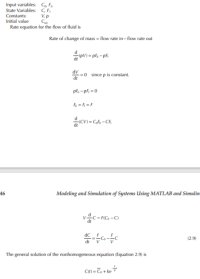You are using an out of date browser. It may not display this or other websites correctly.
You should upgrade or use an alternative browser.
You should upgrade or use an alternative browser.
derivation of an equation
- Thread starter fahadmath
- Start date
You don't know how to solve a first order nonhomogeneous differential equation?
[imath]\displaystyle \frac{dC}{dt} = \frac{F}{V}C_0 - \frac{F}{V}C[/imath]
Which is more commonly written as:
[imath]\displaystyle \frac{dC}{dt} + \frac{F}{V}C = \frac{F}{V}C_0[/imath]
The idea is to use an integrating factor to solve this differential equation. Show us one attempt so that we can see at where you are stuck.
[imath]\displaystyle \frac{dC}{dt} = \frac{F}{V}C_0 - \frac{F}{V}C[/imath]
Which is more commonly written as:
[imath]\displaystyle \frac{dC}{dt} + \frac{F}{V}C = \frac{F}{V}C_0[/imath]
The idea is to use an integrating factor to solve this differential equation. Show us one attempt so that we can see at where you are stuck.
Redundant question - the answer to that question is obvious from the first line of OP.how to solve a first order nonhomogeneous differential equation?
Deriving the differential equation is something and solving the differential equation is something else. The steps of the derivation of the differential equation is already written, but the steps of solving the differential equation to get the general solution is not written.of course i know this method but it is more complex and prolongs the derivation I'm asking for any less complex method to derive the equation
Let me ask you again. Do you want to know how to get this: [imath]\displaystyle C(t) = C_0 + ke^{-\frac{F}{V}t}[/imath]. Or do you want to understand the written steps of how to get this: [imath]\displaystyle \frac{dC}{dt} = \frac{F}{V}C_0 - \frac{F}{V}C[/imath].
Blue or Red?
If your answer is blue, I want you to show me how you will find the derivative of this function, [imath]e^{at}C(t)[/imath], with respect to [imath]t[/imath], where [imath]a[/imath] is a constant.
[imath]\displaystyle \frac{d[ \ e^{at}C(t) \ ]}{dt} = \ ?[/imath]
Bonus Hint: Use the product and chain rules.

